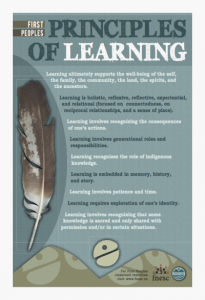**Click Here to visit the SD61 Indigenous Education Department Website**
- Learning ultimately supports the well-being of the self, the family, the community, the land, the spirits, and the ancestors.
- Learning is holistic, reflexive, reflective, experiential, and relational (focused on connectedness, on reciprocal relationships, and a sense of place).
- Learning involves recognizing the consequences of one’s actions.
- Learning involves generational roles and responsibilities.
- Learning recognizes the role of indigenous knowledge.
- Learning is embedded in memory, history, and story.
- Learning involves patience and time.
- Learning requires exploration of one’s identity.
- Learning involves recognizing that some knowledge is sacred and only shared with permission and/or in certain situations.
Background and Context
In addition to the local Esquimalt and Songhees people, BC is the home for 203 First Nations bands whose languages represent 17 distinct linguistic groups. This diversity means that there traditionally has not been one homogenized expression of educational principles as there might be in a single group of Indigenous peoples; however, there are still strong similarities in the ways of knowing and learning, and commonalities in cultural constructs and worldviews among Aboriginal peoples that could serve to enhance the public education system for all students, and these are found in the First Peoples Principles of Learning (FPPL).
Because these principles of learning represent an attempt to identify common elements in the varied teaching and learning approaches that prevail within particular First Peoples societies, it must be recognized that they do not capture the full reality of the approach used in any single First Peoples society
- Read more about the history of the FPPL at the outstanding First Peoples Principles of Learning blog site.
- Please also take time to visit the SD61 Aboriginal Nations Education Division page.
Provincial & Local Resources
- FPPL printable poster (.pdf)
- FPPL printable poster (simple .pdf)
- Les Principes D’Apprentissage Autochtone / PDF
- Aboriginal Worldviews and Perspectives in the Classroom (Click here for French Version)
- Integrating First Peoples Principles of Learning for Student Success (thesis)
- Integrating Aboriginal Ways of Knowing and Learning (Erac)
- FPPL – Implications for Math Classrooms
- FNESC – Bringing Authentic First Peoples Content to the K-3 Classroom
- First Nations Education Steering Committee Curriculum and Classroom Resources
- FNESC Science Curriculum
- FNESC Authentic First Peoples Resources
- Connecting Core Competencies to Aboriginal Books
- Knowing Home: Braiding Indigenous Science with Western Science
- Coyote Science
- Indigenous Cinema in the Classroom (National Film Board)
- The Signs of the Lekwungen People
SD61 Specific Resources
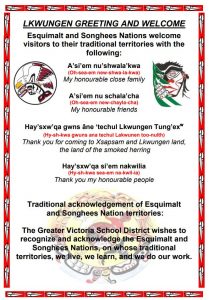
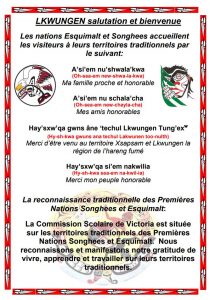
Local Territory Acknowledgement (English)
Local Territory Acknowledgement (French)
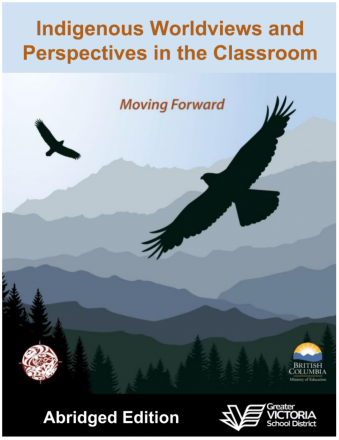
Indigenous Worldviews & Perspectives in the Classroom: Moving Forward (Abridged PDF)
This document is a condensed, quickly accessible version of the larger Aboriginal Worldviews & Perspectives: Moving Forward ministry document. This is an ideal document to include in school based pro-d and will give teachers an accessible guide to determining how to embed these perspectives within their teaching.
SD61 First Peoples Principles of Learning for Teachers (.PDF)
This document represents the thoughts, experience and research of various First Nations and Metis elders, teachers, students and academics. It was produced by the Aboriginal Nations Education Division (ANED), Greater Victoria School District #61 (2017). It is intended to be a guide to conversation and to exploring new perspectives and practices. As such, it will grow and change, as knowledge always does.
Aboriginal Drumming Songs (Google Folder, requires your SD61Learn.ca account to login)
Aboriginal Nations Education has been working to support the district music and choir teachers to weave traditional Aboriginal music and drumming songs into our music curriculum. We have finalized the cultural protocol with three members of the Vancouver Island Nations for the rights to teach and sing their traditional composed songs in our school district. The three singers and composers are Bradley Dick, Lekwungen/Mamalilikala, Jessica Sault, Nuu chah nulth and Gigalis Avery Nelson, Dzawaitaneuk/Snuneymux
https://www.youtube.com/watch?v=dZjshXqEk8o&t=41s&list=PLiVF4Ce6dMMO5tnKNVtrSSmheZy4DF81a&index=1
https://www.youtube.com/watch?v=Po0h36QtpQQ&t=1s
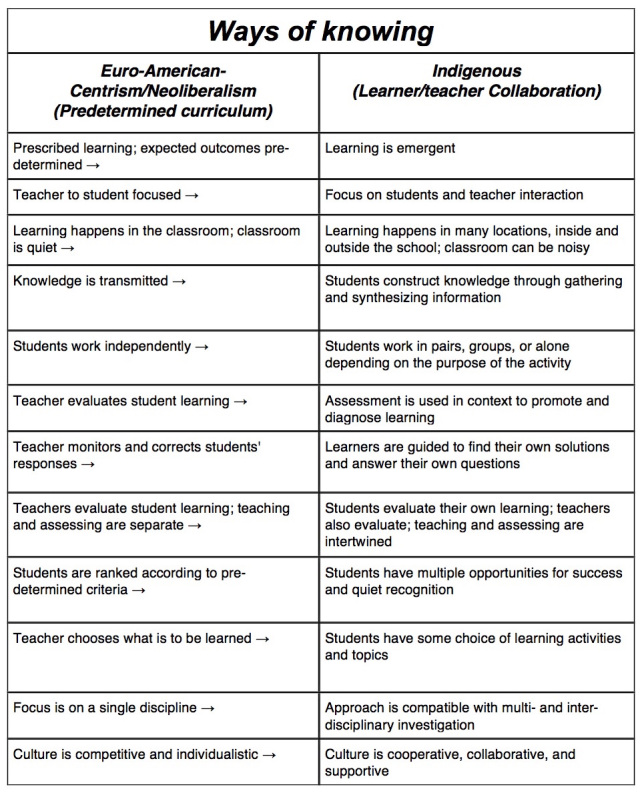
Community Resources
Sierra Club Outdoors K-8 (see .pdf brochure)
Royal BC Museum – Eagle Program
https://www.youtube.com/watch?v=2Z4Bn44giR8
https://www.youtube.com/watch?v=lDSyVpIsvLw&list=PLjKAX9Hi702DoG6Qd0Gm9YnWHBdmGgFGC


